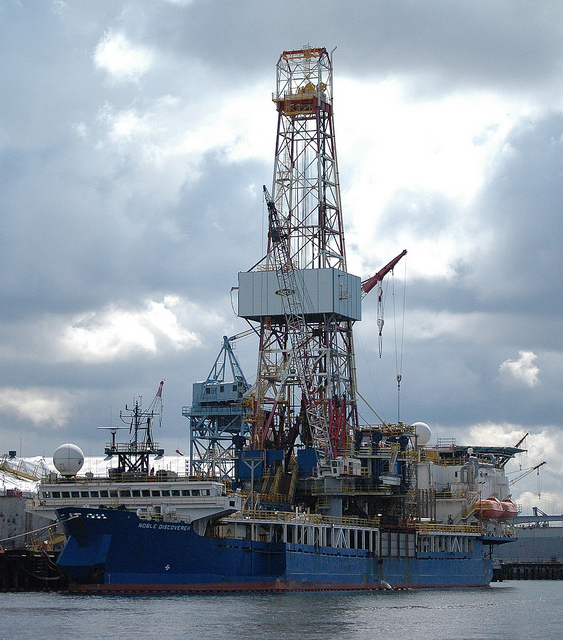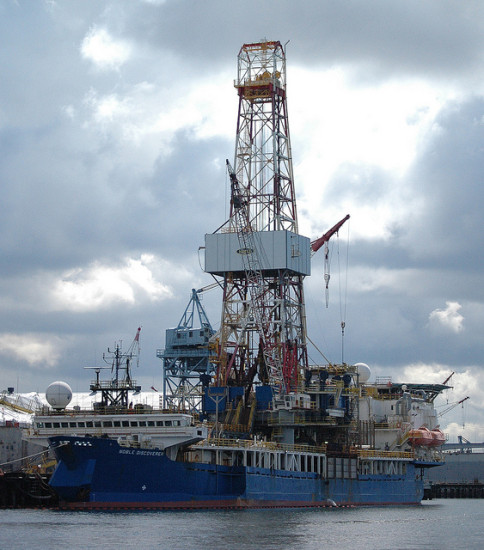The irony oozing from the Port of Seattle these days is thicker than crude oil.
The Port claims to be “the Green Gateway for trade” and employs a jaunty green slogan, “where a sustainable world is headed.” But this week officials quietly inked a deal to lease terminal space on Elliott Bay to Shell Oil for its Arctic drilling fleet, one of the most environmentally destructive endeavors on earth.
Virtually every environmental organization in the region is vehemently opposed to the Port’s move: already on record are Washington Environmental Council, Climate Solutions, Sierra Club, Greenpeace, Earthjustice, the Audubon Society, 350.org, and practically every other group you can name. Yet despite vocal opposition from green leaders, plus an outpouring of objections from the people of Seattle the Commissioners claim to serve, the Port opted not to engage in further dialogue or solicit community input, but rather to rush the deal, signing a lease far sooner than anyone expected to allow Foss Maritime to host Shell’s vessels on Seattle’s public land.
To their credit, two of the Port’s commissioners—Courtney Gregoire and Tom Albro—tried to put a hold on the deal.
Gregoire and Albro were out-maneuvered by the other three Port commissioners—John Creighton, Bill Bryant, and Stephanie Bowman—who ushered the contract through with little chance for public feedback. (For a fuller accounting of how the politics worked, see Sydney Brownstone’s excellent reporting at The Stranger.) All three trumpet their supposed environmental bona fides. Yet when given a choice, they voted for the Port to be a crucial part of a notoriously reckless oil company’s plans to drill in an environmentally fragile part of the Arctic.
It’s time for an accountability check.
John Creighton
John Creighton has repeatedly insisted that environmental stewardship is a top priority for him, often deploying a mantra that his goal is for the Port is to be “the greenest, cleanest, most energy efficient port in North America.” And his commitment to environmental protection sounds sincere in his bio on the Port website. Here’s what Creighton told voters when he was campaigning for re-election:
…as commissioner I have focused on working to keep the Port strong as a regional jobs creation engine, while making it a more publicly accountable, environmentally sustainable operation.
During his election, Creighton even produced a video titled “Why should voters consider the environment a priority in the Port of Seattle race?”
His pitch convinced Washington Conservation Voters to endorse him. He’s also been endorsed by Sierra Club, Cascade Bicycle Club, Bill Ruckelshaus, and just about every Democrat and Democratic group west of the Cascades.
Yet the Commissioner Creighton of today sounds nothing like candidate Creighton of yesterday. In fact, when he was running for office he argued against precisely the kinds of justifications and excuses he is now using in defense of his support for the Shell deal.
Here’s Creighton on the stump in 2012:
Often, concerns about the environment go by the wayside when policy makers begin discussing job creation. Seattle can point the way toward a new future, where robust job creation walks hand in hand with a profound respect for the environment. I’ve worked hard to make that point clear, and I’m incredibly proud that these environmental organizations have recognized my commitment to green policy.
Later, he wrote that the Port must make sure that “the jobs we add don’t come at the expense of the health of our planet.”
At a Port Commission meeting on earlier this week, Creighton said, “I have not shied away from ruffling the feathers of local businesses when I felt that either the port or our tenants needed to go above and beyond current environmental standards to achieve a tangible environmental good.” Creighton has also prided himself on seeking public feedback on Port decision-making. But when confronted with a hard choice, he opted to facilitate a backroom deal for a project of staggering environmental harm.
It is perhaps notable that Creighton has financial connections to the project’s backers. Records with the Washington Public Disclosure Commission show that during his 2013 election campaign, he received $400 from Paul Stevens, CEO of Foss Maritime, the company that would host and work on Shell’s fleet. And he has a longer history with the owners and executives of Foss’s parent company, Saltchuk Resources: Creighton netted $8,800 from Mike and Lynn Garvey, the primary owners of the firm, from 2005 to 2013; and he raked in a combined $3,700 from Stanley and Alta Barer, the chairman emeritus and a co-owner, respectively, of Saltchuk, over the same period.
Bill Bryant
“I am a committed conservationist,” Bill Bryant told Port commission meeting attendees on Tuesday. “It is on my bucket list to make sure that when I die, Puget Sound is healthier than when I was born.”
“At the Port of Seattle,” Bryant bragged a few years back, “we’re proving that we can rise to what I think is the challenge of time—to generate jobs while protecting the environment.”
He is a founding board member of Stewardship Partners and the Nisqually River Foundation. And according to reporting from the right-leaning Washington State Wire, Bryant “considers himself an environmental pragmatist.”
His pragmatism was apparently convincing enough to win him an endorsement from Washington Conservation Voters in his last election.
In his official Port bio, Bryant also touts the importance of, “increasing the Port’s transparency and public accountability.”
And Bryant is considering a run for governor in 2016. Veteran political reporter Joel Connelly likened his brand of conservation to Teddy Roosevelt’s.
Despite what he says he believes about environmental protection, Connelly reports that, “Bryant sharply criticized green groups who called a news conference to denounce plans to let Foss Marine use Terminal 5, at the Port of Seattle, to berth, supply and retrofit Shell Oil’s drilling fleet for the Arctic. He supports the Shell lease.”
Like his colleague Creighton, Bryant also has benefited the largesse of some of the principal players in the Shell oil drilling drama. Public records reveal that Saltchuk’s primary owners Michael and Lynn Garvey gave him $3,600 during his 2007 and 2011 elections, while Stanley and Alta Barer also kicked in another $8,800 during those elections. As the parent company of Foss Maritime, Saltchuk would benefit financially from the Port’s pro-drilling lease decision.
Stephanie Bowman
As recently as 2013, Bowman too enjoyed an endorsement from Washington Conservation Voters.
Nonetheless, she gave the go-ahead. In fact, she did not even support a motion by Commissioner Albro that would have extended the decision-making process and allowed more public participation.
What does it all mean? And what’s next?
One decision for one city’s port may seem insignificant in the scheme of things.
The three commissioners claim that the drilling fleet work is going to happen elsewhere if not Seattle, so why not take some money for the Port? But the truth is that Arctic drilling is incredibly, even prohibitively, expensive. The margin for profit is razor thin. In fact, so many ventures have failed, at enormous expense, that Shell is among only a few companies currently even considering the risky enterprise. Environmental leaders like Climate Solutions’ KC Golden, former Seattle Mayor Mike McGinn, and many others argue persuasively that a deal like the Port’s could make or break the economics of the endeavor, which means that the Seattle Port’s decision to make drilling cheaper and easier for Shell could be the difference between leaving huge fossil fuel reserves in the ground or burning them.
Given accepted scientific analyses that Arctic oil must remain entirely unburned if we hope to avoid catastrophic consequences for our climate, the “footprint” of this commission’s decision affects not only Elliot Bay or even Washington state, but may have global proportions—and impacts—for many generations to come.
A while back Creighton tweeted, “Policy makers & citizens alike have an obligation to protect our state’s resources & natural beauty for future generations.” Bowman and Bryant would likely agree with this sentiment. Yet when it came time to cut a deal with Shell, all three seem to have lost their mooring to the values that are so easy to espouse to the Seattle electorate on the campaign trail.
The political risk to each is a permanent oily stain on their reputation. The risk to future generations is far more dire.















Alpental10
Shame, shame on these people. What a misrepresentation to the voters of who these three are. It’s too bad there aren’t more options for the people who voted for Creighton, Bryant, and Bowman than simply recall them (assuming that’s an option in this case. Still this is a huge blemish on them and should follow them wherever they go politically. We will remember this Bryant. It will follow you like a bad smell.
RDPence
And Commissioner Bryant wants to be a candidate for Governor? Stunts like this will cost him votes in King County and perhaps beyond.
qmmayer
In the past, the Port hasn’t been know for it’s green credibility so it seems especially unfortunate that those candidates who appeared interested in promoting a sustainable vision so quickly shed their claimed values. This was a missed opportunity that could have been a meaningful setback for Shell. I hope that there is some accountability, but I fear these down ticket races are hard to influence when its election time. Perhaps its a measure of some small success that they even bothered to trot out environmental credentials.